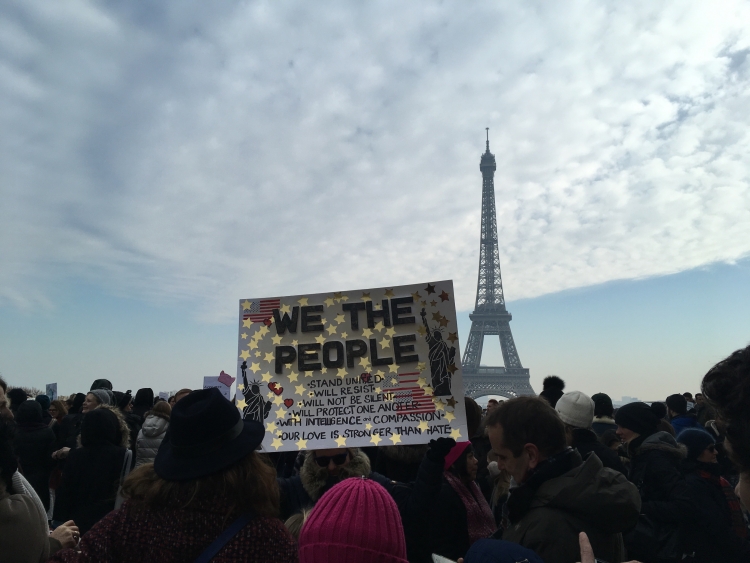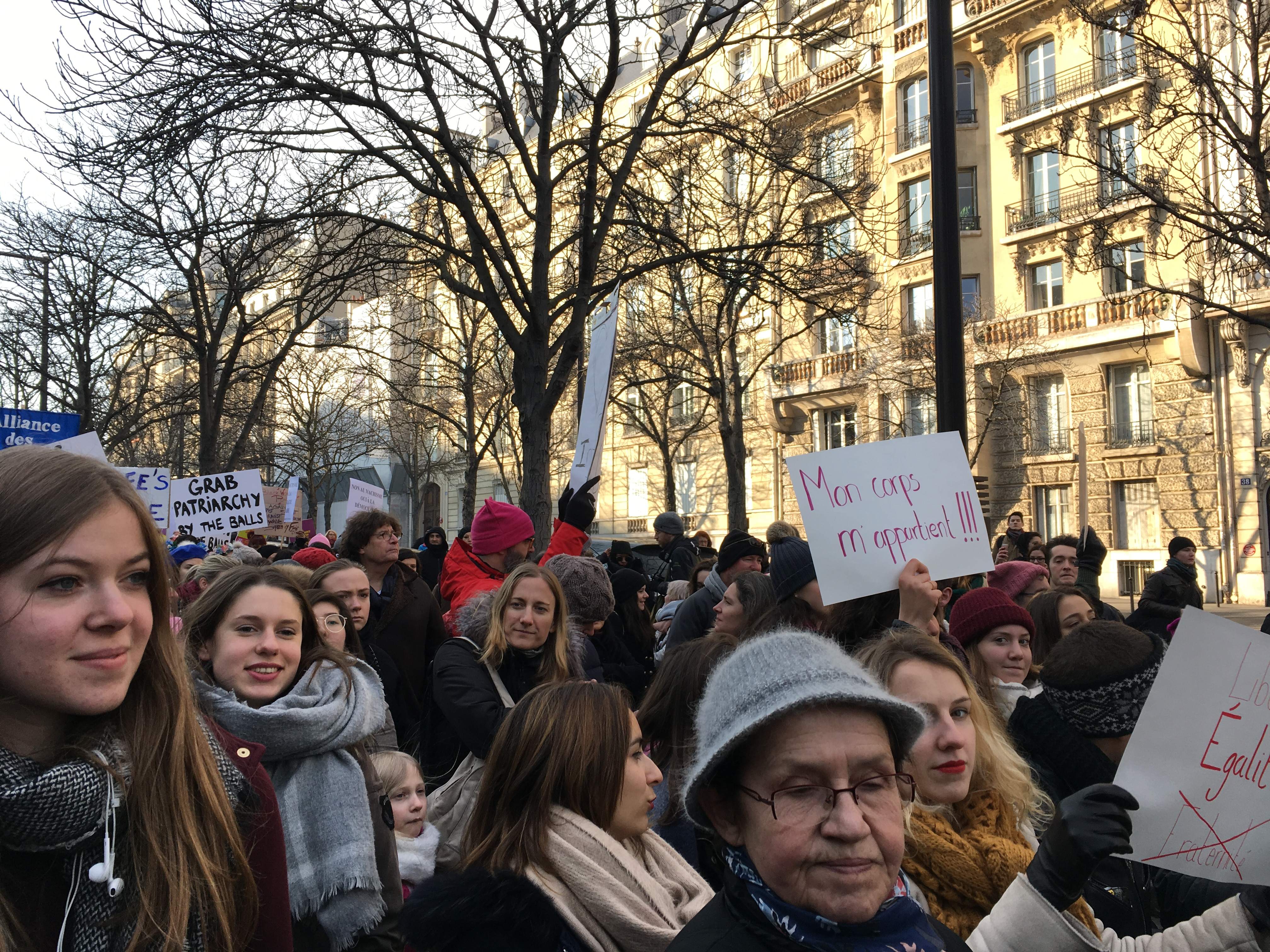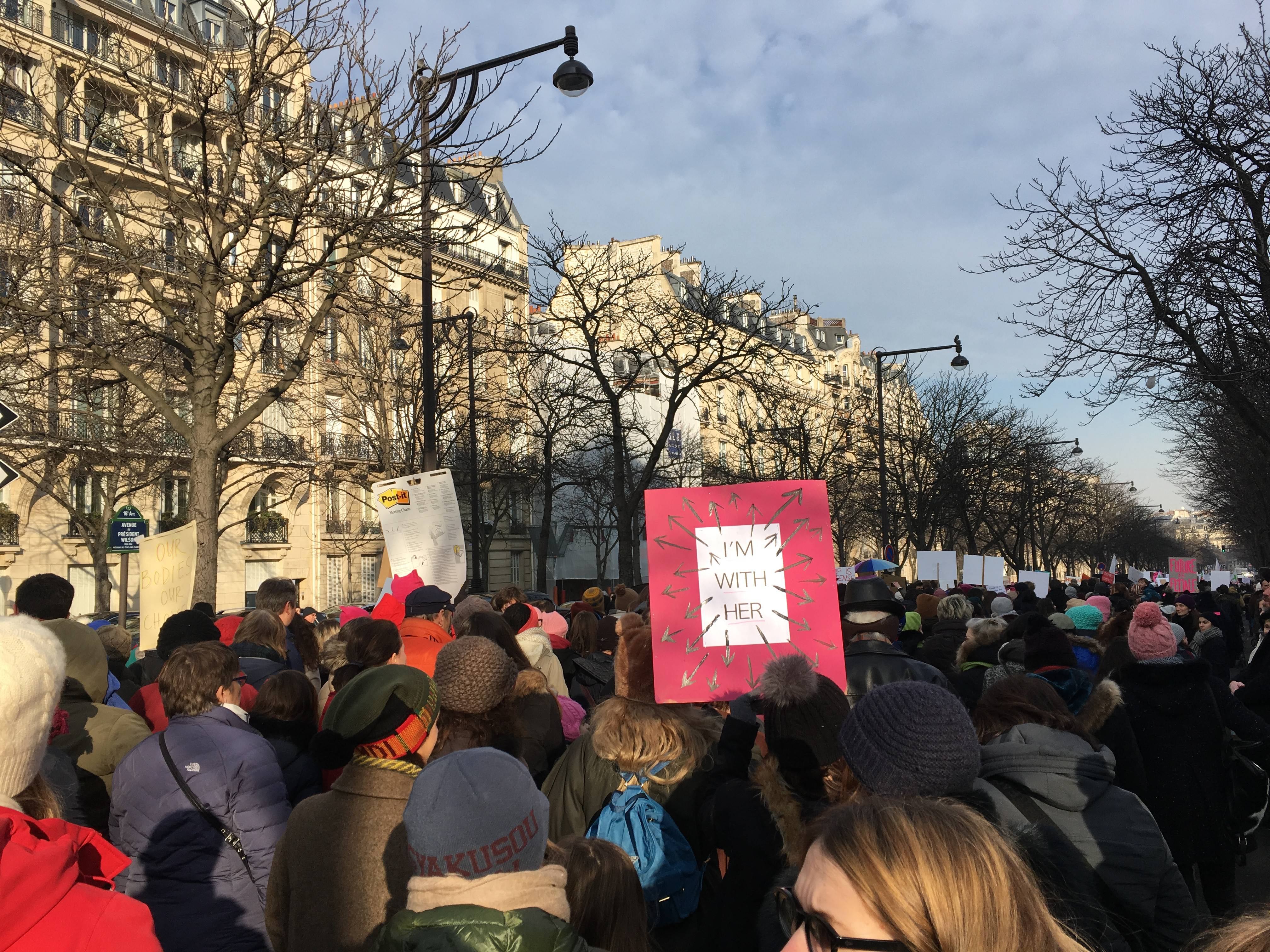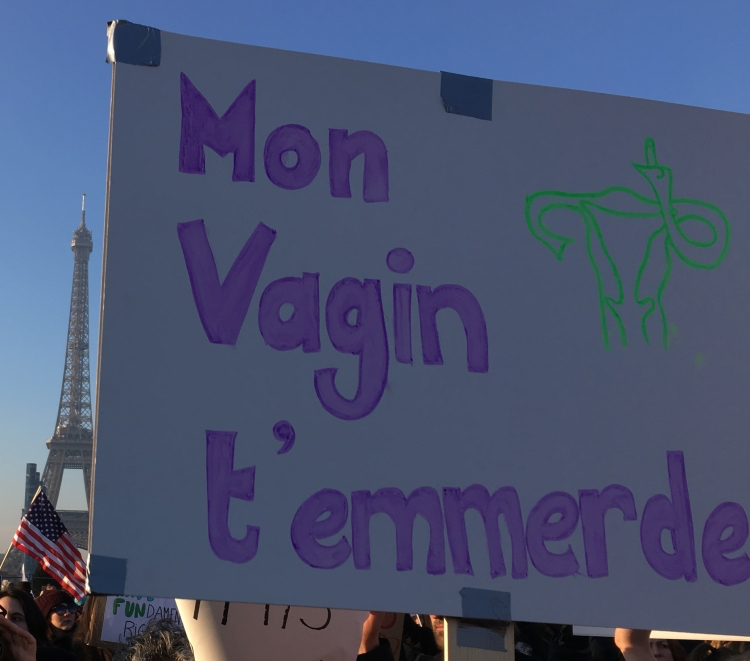Les Femmes Ont La Parole

Thousands of people marched in Paris from Trocadéro to École Militaire last weekend. Marches took place on every continent in over 600 cities organized as "sister marches" to the main event in Washington DC following Friday's presidential inauguration. The streets of Washington, D.C. were packed to their capacity as 470,000 individuals marched for women's rights. The marches were designed for people to show their solidarity in the wake of misogyny and right-wing extremism. The call for action's motivation lay in the desire to show unity among women and minorities demanding their rights. This call expanded to become a universal denunciation of Trump, whose populist, reactionary rhetoric and overt bigotry have won him support from the likes of racist organizations, such as the Ku Klux Klan.
Image credit: Isabel Guigui
The march set off at 2 p.m. last Saturday. The sky stretched wide above the crowds mingling on the Place du Trocadéro, where joyful energy was tangible. Young children brandished signs their parents had written, friends found each other and laughed in excitement as people milled about taking photos of each other's posters and creating conversations.
The crowd packed more densely on the east side of the square where two young American women had scrambled up a low wall among others for a better vantage point. Balling their fists, they led the masses with fierce cries of "Not my president!", "The pussy grabs back!", and "No hate, no fear—everybody is welcome here!"
Image credit: Isabel GuiguiWhen the group stepped off around 2:30 a marching band set the soundtrack, leading the masses down the Avenue du Président Wilson with French hymns that were joined in song by many voices. As the procession continued, I wove through the throngs and stopped at random to speak with different participants. The first young ladies with whom I spoke were American college students, one of whom told me "I don't think [the election] really represents American values. I don't know how this happened," to which the other began to list the dangers of a Trump presidency.
Image credit: Isabel GuiguiWhen I asked them what they thought the rise of populist leaders around the world will mean for minorities, the first admitted, "I guess I can kind of understand the pushback ... you know, people who feel that their needs aren't being represented, I can understand that and respect that, but I don't necessarily think that ... the far right is going to solve the problems that they think it will." Her friend ventured, "I think it could be the re-polarization of the world." As the masses crossed the Pont d'Iéna, many paused to take photos of the various signs and banners framed under the Eiffel Tower.
"I DON'T THINK [THE ELECTION] REPRESENTS AMERICAN VALUES"
Crossing onto the Left Bank I fell into step with a group of middle-aged women clad in dark coats; their backs lettered with pink Duct tape; their faces decked with bands of black paint that stretched across their eyes. A pair directed me to the ringleader; I asked her how a Trump presidency would affect her and her comrades, and breaking neither rhythm nor the links her arms made in the wall of women, she responded: "Well, it is affecting us already in fact. It liberated sexist discourse and we are already feeling those effects." As her comrades chanted "Nous sommes puissantes, nous sommes cinquante-deux pourcent." She explained that the rise of populist leaders like Trump means "a regression for our rights, on one level regarding our bodies, and on the other regarding the economic conditions and the conditions of our professional lives."
Image credit: Isabel GuiguiWhen asked how women and minorities could take action to promote their rights, the woman listed the figures of the female population of France and the world, as well as the percentage of the workforce that is represented by women concluding, "You only have to imagine that two and a half or three billion people take to the streets tomorrow in strike." My conversation with a black woman of the same age group echoed the sentiments of the previous: "[Trump's presidency] is already affecting me! That's why I'm here! Frankly, this touches me. As a woman, this affects me, and as a black even more so." I then asked if she had some words of solidarity for women around the world that she would like to share; she replied emphatically, "To all the woman, all around the world all I can say is this, our slogan: that the rights of women shall be universal, like the violent acts that are committed to them!"
"You only have to imagine that two and a half or three billion people take to the streets tomorrow in the strike."
As the march turned onto the Avenue de la Bourdonnais, I approached a tall man with a weathered face who was clad in a jacket stenciled with the words "Love will save the planet," he also carried a larger poster that read "Bridges not walls/ Occupy love." When I asked him where he was from he said, "Where do I come from? I come from everywhere;" he explained that as an activist he spent his life traveling and taking part in demonstrations around the world. The man called the Trump presidency "a nightmare," and expressed the hope to see him impeached because, "it's not possible for him to lead like this for four years, someone who is racist, sexist - we are living a permanent nightmare. We must absolutely increase mobilization." He urged citizens to get out on the streets to put the pressure on their governments "because this is the only path."
Image credit: Isabel Guigui
Indeed, over 2000 people took to the streets on Saturday, and as the march wound down by the Wall of Peace across from École Militaire the chants rose again.












